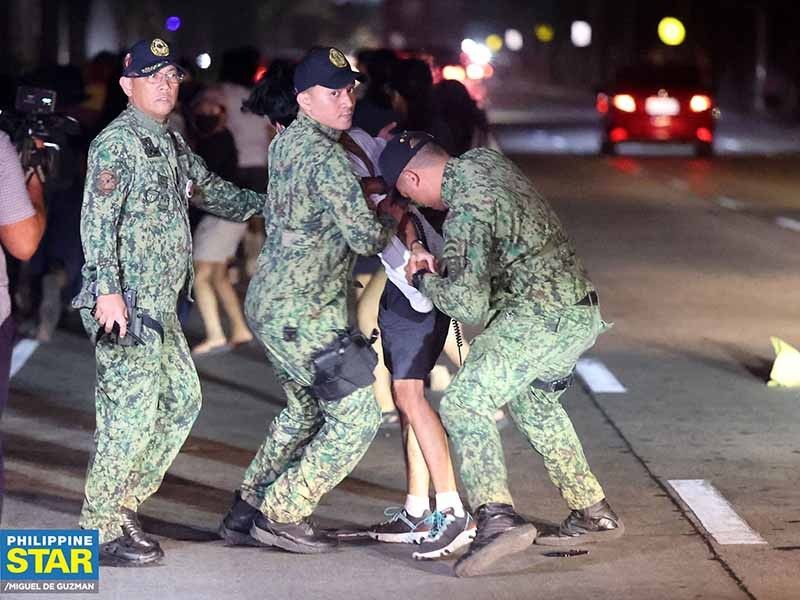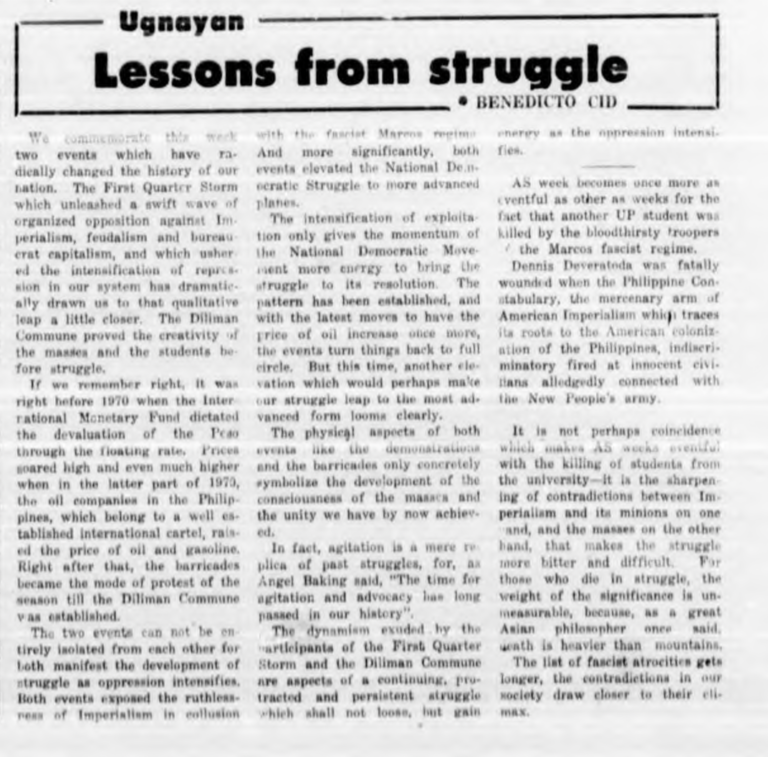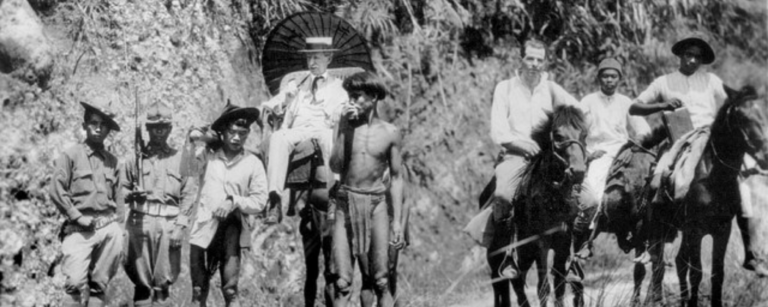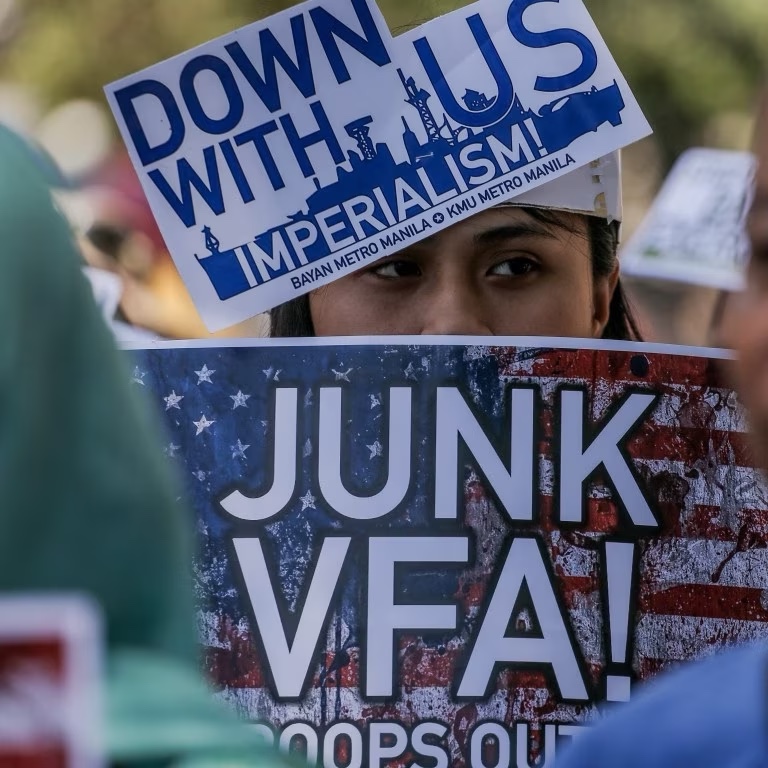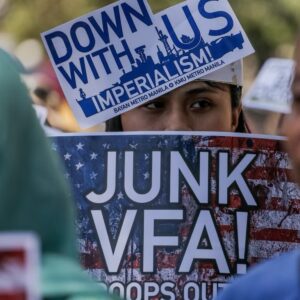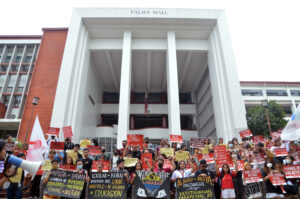[FROM THE ARCHIVE] The persistent struggle of local colleges and universities against campus militarization is in no way detached from the masses’ fight against police and military intervention. For the longest time, the clamor of schools has always transcended the corners and walls of campuses; from defending academic freedom to demanding accountability to ousting the tyrant Duterte, the ultimate goal has always been genuine change and inclusive development at a societal level.

The persistent struggle of local colleges and universities against campus militarization is in no way detached from the masses’ fight against police and military intervention. For the longest time, the clamor of schools has always transcended the corners and walls of campuses; from defending academic freedom to demanding accountability to ousting the tyrant Duterte, the ultimate goal has always been genuine change and inclusive development at a societal level.
The unilateral abrogation of the UP-DND Accord and the intensifying campus militarization in UP provides a dangerous precedent for the “whole-of-the-nation” militarization of the country. With the Duterte regime’s tired maneuvers to prove its“NPA breeding ground” point, it attempts to save face amidst a deluge of controversies and blunders.
FRIENDS OF THE PEOPLE?
Department of National Defense (DND) Secretary Delfin Lorenzana wrote in a letter addressed to UP President Danilo Concepcion that the UP – DND Accord was considered a hindrance in “providing effective security, safety, and welfare of the students, faculty, and employees of U.P.” He also added: “We want them to see their armed forces and police as protectors worthy of trust, not fear.”
Right after the Accord’s termination, armed and uniformed military personnel were sighted immediately inside the UP Diliman campus, allegedly visiting their “urban gardening project.” The military’s unwarranted presence drew the ire not only of the students, but also UP professors, alumni, workers, and residents of Barangay U.P. Campus.
Armed Forces of the Philippines (AFP) Spokesperson Maj. General Edgard Arevalo quickly defended the military’s antics, saying “this is proof that the armed forces is not an enemy.”
Unfortunately for Arevalo, these “for-show” projects could never heal the tarnished image of the police and military as protectors of the elite. Persistent state attacks against the masses have created immense distrust and disgust against these “rotten-to-the-core” institutions.
As the COVID-19 pandemic rages on, state forces have been busy cultivating their online presence to target critical media outlets. SINAG, the official student publication of the College of Social Sciences and Philosophy of UP Diliman, had to begin anew on Facebook after its page suffered from sustained attacks from paid online trolls.
And here are three main reasons why the police and military came to exist as such:
1. LONG LIST OF HUMAN RIGHTS VIOLATIONS
Tracing the reasons why and how the UP-DND accord materialized supports the point that state attacks have persisted since time immemorial. According to UP Journalism Professor Danilo Arao, the UP-DND Accord was signed due to an abduction incident inside UP premises. Last June 16, 1989, Philippine Collegian writer Donato Continente was abducted by state forces and was eventually tortured and forced to confess to the killing of Col. James Rowe. Fourteen days since the incident, the UP-DND Accord was signed.
To this day, cases of state-led attacks continue to increase. Human rights defenders along with the masses are consigned to terrorist attacks carried out by the police and the military. Dissent and the legitimate airing of concerns are equated to rebellion and terrorism. Human rights violations are defended as “legitimate” operations. Counter-insurgency is utilized to pave the entry of multinational corporations into the lands of peasants and National Minorities.
Such was the case for the unarmed Tumandoks who perished at the hands of state elements.
On December 30, 2020, nine (9) Tumandoks were brutally killed by joint forces of the Armed Forces of the Philippines (AFP), Philippine National Police (PNP), and Criminal Investigation and Detection Group (CIDG). Among those killed were respected leaders of the various Tumandok communities in Panay, such as village councilor and former village captain Roy Giganto and village councilor Reynaldo Katipunan.
Sixteen (16) Tumandoks were also arrested in the same operation.
The Tumandok massacre is now incuded in the long list of massacres under the Duterte regime. Five (5) unarmed mango farm workers were gunned down by the PNP-CIDG last December 17, 2020 (Baras 5 Massacre); fourteen (14) farmers were killed by state forces in Negros Oriental on March 30, 2019 (Negros Oriental 14 Massacre); and six (6) farmers were murdered by police operations in Guihulungan, Negros Oriental way back in March 30, 2019 (Guihulngan Massacre).
2. TO SERVE AND PROTECT THE ELITE
The PNP and AFP are perpetual slaves to the self-serving interests of a State utterly dominated by landlords, corrupt politicians, and capitalists. To consolidate economic and political power, the police and military act as agents of the preservation of the status quo — elite dominance and abuse of the masses — through violence and force.
The movement for national democracy is only growing stronger. As price hikes, salary decreases, and other free-market schemes were being implemented, workers, peasants, national minorities, women, and the rest of the masses have united, organized, and mobilized to condemn anti-people policies.
Workers launched picket lines to demand for better working conditions and just wages. Farmers launched “bungkalans” to assert their right to land. And for the other sectors, rallies amplified the calls of the oppressed.
In such instances, which side do the police and military take? Do they side with the exploited masses or the exploitative capitalists?
If the motto of the PNP is to “serve and protect” the Filipino people, why is it that they are always stationed right in front of any stronghold of the abusive government, holding riot shields and batons, ready to defend to death their capitalist bosses during protests or mobilizations? If the motto of the AFP is “securing the people, securing the land,” why is it that they kill the very people who struggle for genuine freedom and national democracy?
For the longest time, this rotten tradition of state forces continues to be taken advantage of by politicians, especially the President, to advance political pursuits. As the Commander-in-Chief, the police and the military have always been indebted to serve the President’s interests. Similar to local warlords who possess private goons for power, the President has a “private” army which they strive to satisfy, with the goal of increasing their level of indebtedness to the Presidency.
A clear example is the Duterte regime’s shtick to endow retired military generals with civilian positions and the prevalence of the “revolving door” policy, which, according to political scientist Dr. Aries Arugay, refers to the quick transition of key police and military positions to serve the interests of top officials.
3. COLONIAL CHARACTER; DIVIDE AND CONQUER
The final reason why the police and military are abhorred is due to their colonial character. Throughout the country’s history, all colonizers made use of the “divide and conquer” strategy to usurp the country. Locals were commissioned by foreign invaders to wage a war against their fellow Filipinos and ensure the supremacy of imperialists. A glaring example is seen in the formation and subsequent use of the Philippine Constabulary (PC) to extinguish the remaining forces of Emilio Aguinaldo.
Under American occupation, the Philippine military fell to the guidance of the military of the United States of America (USA) which greatly influenced its strategies and operations. During the postwar era, US dominance was still felt after the country agreed to dubious military deals such as the US-RP Military Bases Agreement, Mutual Defense Treaty, and the Enhanced Defense Cooperation Agreement (EDCA) even if the Filipino people were put to a great disadvantage.
The sphere of US military control spills over as well to the internal orientation of the Philippine military. Given the US’ aim to preserve capitalism and its dominance over satellite countries, the local military is guided by Uncle Sam’s goal to crush a just and humane economic system for the world. Since then, the “national liberation” principle of the military has been inherently distorted towards “freedom” achieved via cahoots with imperialists.
To this day, divide and conquer is a pervading reality in Philippine society. State forces continue to target the national democratic forces whose principle lies in dismantling the three ills of Philippine society — imperialism, bureaucrat-capitalism, and feudalism — and fight for true freedom and democracy.
PEOPLE’S ARMY
With murderers, elite slaves, and imperial puppets at the helm of “protecting” the masses, the Filipino people are always in danger of harm and fighting one another for scraps. And without people to valiantly protect them, the masses may eventually take up arms to not only defend themselves but also wrest political power. Thus, revolutionaries, along with the masses, created the New People’s Army (NPA) to demand genuine change in society.
Armed struggle is a necessary instrument for the unheard to make their voices heard; it is a legitimate undertaking of the oppressed to fight for a society that is just and humane.
The protracted people’s war waged in the Philippine countryside is no different from the battles led by Andres Bonifacio and Filipino revolutionaries. Similar to the present national-democratic movement, they had the goal of national liberation for the country from the shackles of imperialist control.
Ever since the Philippines was granted faux post-war independence, the countryside revolution has always been part of our nation’s history. It is a no-brainer and a given notion that abusive conditions force the masses to take up arms and wage a revolution.
But, the point of inquiry must not stagnate on the questions of who, what, when, and how? The inquiry must focus on the why.
Why did they take up arms? Why did they choose the road less traveled? Why did they sacrifice everything for their lives?
It is high time to know the real picture and legitimacy of the insurgency — they are not terrorists.
The featured image is from Philippine Star

